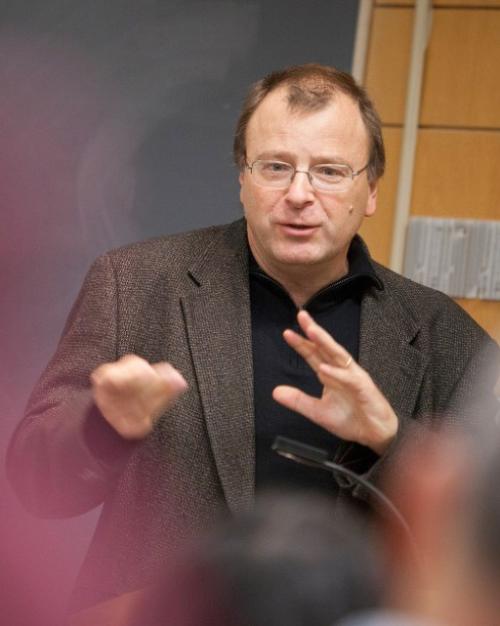Nicolas van de Walle, the Maxwell M. Upson Professor of Government in the College of Arts and Sciences, who played a formative role in the field of comparative politics, died on July 15. He was 67.
Known for his scholarship on Africa’s politics, from political economy to democratization and electoral politics, van de Walle contributed decades of award-winning work on regime transitions and continuity, leadership succession, foreign aid, clientelism, political parties and governance.
During 20 years at Cornell, van de Walle served as director of the Einaudi Center for International Studies, associate dean for international studies and chair of the Department of Government, among other leadership positions. Interested in practical policies as well as theory, van de Walle built a reputation as an expert who was liked and respected by colleagues in the Cornell community and around the world.
“Our cherished friend and colleague Nic van de Walle has shaped the field of political science, and African politics in particular,” said Rachel Beatty Riedl, the Peggy J. Koenig ’78 Director of the Center on Global Democracy in the Cornell Brooks School of Public Policy, and a professor in the Brooks School and Department of Government (A&S). “His insights into the politics of economic policymaking and ‘permanent crisis,’ the driving forces of regime dynamics, electoral politics and democratic transitions, continue to underpin the foundations of comparative politics.”
“He was a formidable scholar of political economy and sub-Saharan African politics,” said Valerie Jane Bunce, the Aaron Binenkorb Professor of International Studies Emerita (A&S). “Nic was interested in all the things that shape politics — the domestic and international economy, political leaders and parties, legislatures and bureaucracies, public policy, civil society, public opinion and foreign policy.”
As a political scientist, van de Walle paid attention to “the grit of politics” in addition to theory, Bunce said: “He wanted to understand what governments do and what difference their actions make.”
“Nic was not only an intellectual giant in the study of African politics and the political economy of development, but also one of the field’s most well-liked and highly respected figures,” said Kenneth Roberts, the Richard J. Schwartz Professor of government (A&S). “Everyone who worked with Nic appreciated his wisdom, compassion and good humor; he never failed to make Cornell a better place.”
Friends throughout the university remember van de Walle as “an important leader, a wonderful colleague, and a kind and generous soul with a sharp wit and an easy smile,” said Thomas Pepinsky, the Walter F. LaFeber Professor in the Department of Government (A&S) and professor in the Brooks School.
As an adviser and teacher, van de Walle gave time and attention generously, allowing students to explore ideas while providing support and guidance to nurture them, said Thalia Gerzo, LLM ’17, Ph.D. ’23, an assistant professor at the University of York. “Nic did not care about the new ‘hot topic’ or shiny methodological tools; he wanted his students to know the literature well, tackle big questions and produce interesting work.”
“Nic encouraged me to pursue the ideas that I found most important and never ceased challenging me to become a better scholar,” said Joseph Lasky, a doctoral candidate in government. “My first experience as a teaching assistant was for his African politics course. I witnessed firsthand how deeply he cared about connecting with undergraduate students.”
“Humble, kind, brilliant, generous, and funny – Nic is a role model for all of us,” said Jaimie Bleck, Ph.D. ’11, associate professor of political science at the University of Notre Dame. “Nic encouraged us, believed in his students – often before we believed in ourselves – and he made us better scholars, but he also saw us as people first.”
Van de Walle was known for his warmth and love of personal conversation, for starting off even academically focused meetings with questions about topics such as gardening, tennis, family news and boating on Cayuga Lake.
“His interests were capacious. He was humane,” said Peter J. Katzenstein, the Walter S. Carpenter, Jr. Professor of International Studies (A&S). “And the twinkle in his eye signaled a tolerance of life’s many absurdities. Nic taught me that a light touch can leave a deep imprint.”
Nicolas van de Walle was born on June 25, 1957 in Brussels, and he spent his childhood in Belgium, Burundi and the United States.
He completed his undergraduate studies in international relations at the University of Pennsylvania in 1979. He received a master’s degree in the same field at the London School of Economics and Political Science in 1980, then worked in Brussels at the European Community and Tunisia with the United Nations. He received his Ph.D. from Princeton University.
Van de Walle taught at Michigan State University from 1990 to 2004. He arrived at Cornell in 2004 to direct the Einaudi Center, which he did until 2008. He has been a faculty member in the government department since 2004.
He was a fellow at the Overseas Development Council from 1994 to 2000 and a non-resident fellow at the Center for Global Development from 2001-12. He also worked as a consultant for the World Bank, USAID and other organizations.
Van de Walle published widely in political science, development studies, public policy and African studies, including the 2022 book “Democratic Backsliding in Africa? Autocratization, Resilience, and Contention,” co-edited with Leonardo R. Arriola and Lise Rakner, and the 2018 book “Electoral Politics in Africa Since 1990: Continuity in Change,” co-authored with Bleck. His other books include “Democratic Experiments in Africa: Regime Transitions in Comparative Perspective” (1997, with Michael Bratton), “Democratic Trajectories in Africa: Unraveling the Impact of Foreign Aid” (2013, with Danielle Resnick) and “Overcoming Stagnation in Aid-Dependent Countries” (2005).
He also wrote the Africa book review section for Foreign Affairs from 2004 until 2024.
Among his honors are the 2022 African Politics Conference Group/John Harbeson Distinguished Africanist Award and the G.M. Luebbert Prize of the American Political Science Association for the best book in comparative politics of 2001, for “African Economies and The Politics of Permanent Crisis, 1979-1999.”
Nicolas van de Walle is survived by spouse Michèle van de Walle; two daughters, Nadia and Juliette; and three grandchildren.
Kate Blackwood is a writer for the College of Arts and Sciences.
A version of this article appeared in the Cornell Chronicle.






